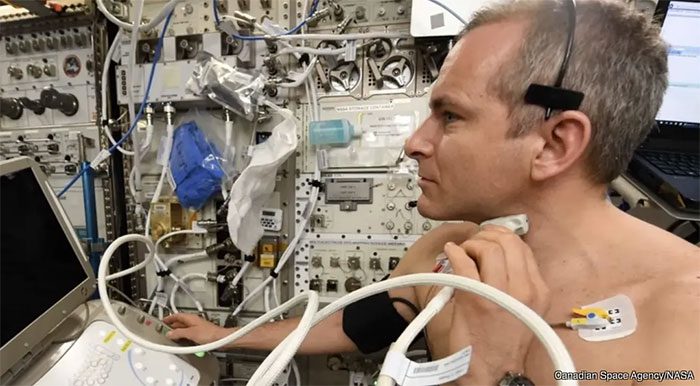When you look at images of astronauts floating in the International Space Station (ISS), you may notice their appearance is somewhat unusual. Yes, their hair is standing up, but there’s something else – something you can’t reach out and touch. If you take a close look at their faces, you’ll see the blood vessels bulging in their necks or faces. The reason? It’s gravity. More specifically, the absence of it.
Our bodies have evolved to adapt to Earth’s gravity, so normal activities like grocery shopping or playing with pets help maintain our bodily functions, much like a car getting regular oil changes. When the body is placed in a microgravity environment, everything changes. According to NASA, in the absence of normal gravity, our bodies are not subjected to external forces, causing the heart and blood vessels to become… “lazy.”
On Earth, gravity pulls blood and other bodily fluids down to the abdomen and legs. This is why when standing for long periods, your legs and ankles swell. But in the weightlessness of space – whether artificial or natural – blood is pushed up to the chest and head instead of down. This shift in bodily fluids results in astronauts experiencing bulging blood vessels.

Daily health checks are an essential activity for astronauts on the ISS.
The effects of microgravity significantly impact the body and the circulatory system. NASA and other space agencies around the world have dedicated considerable time and effort to studying the consequences of microgravity, aiming to mitigate the impacts that living in space can have on the human body.
According to NASA, blood pooling in the chest and head can lead to negative health effects, such as hearing loss, increased intracranial pressure leading to brain swelling, and distortion of the eyeball (known as Spaceflight Associated Neuro-ocular Syndrome, SANS). The lack of gravity also causes muscle atrophy and alters the shape of the heart from oval to spherical.
When astronauts return to Earth, blood and bodily fluids are pulled back down to the abdomen and legs as before. This shift, along with other changes to the body, makes it difficult for the body to manage a drop in blood pressure. Consequently, some astronauts may experience dizziness and occasionally faint – a condition known as “orthostatic hypotension.”
Our bodies are a marvel, capable of adapting to any environment. However, space is clearly not a truly friendly environment for humans!





















































